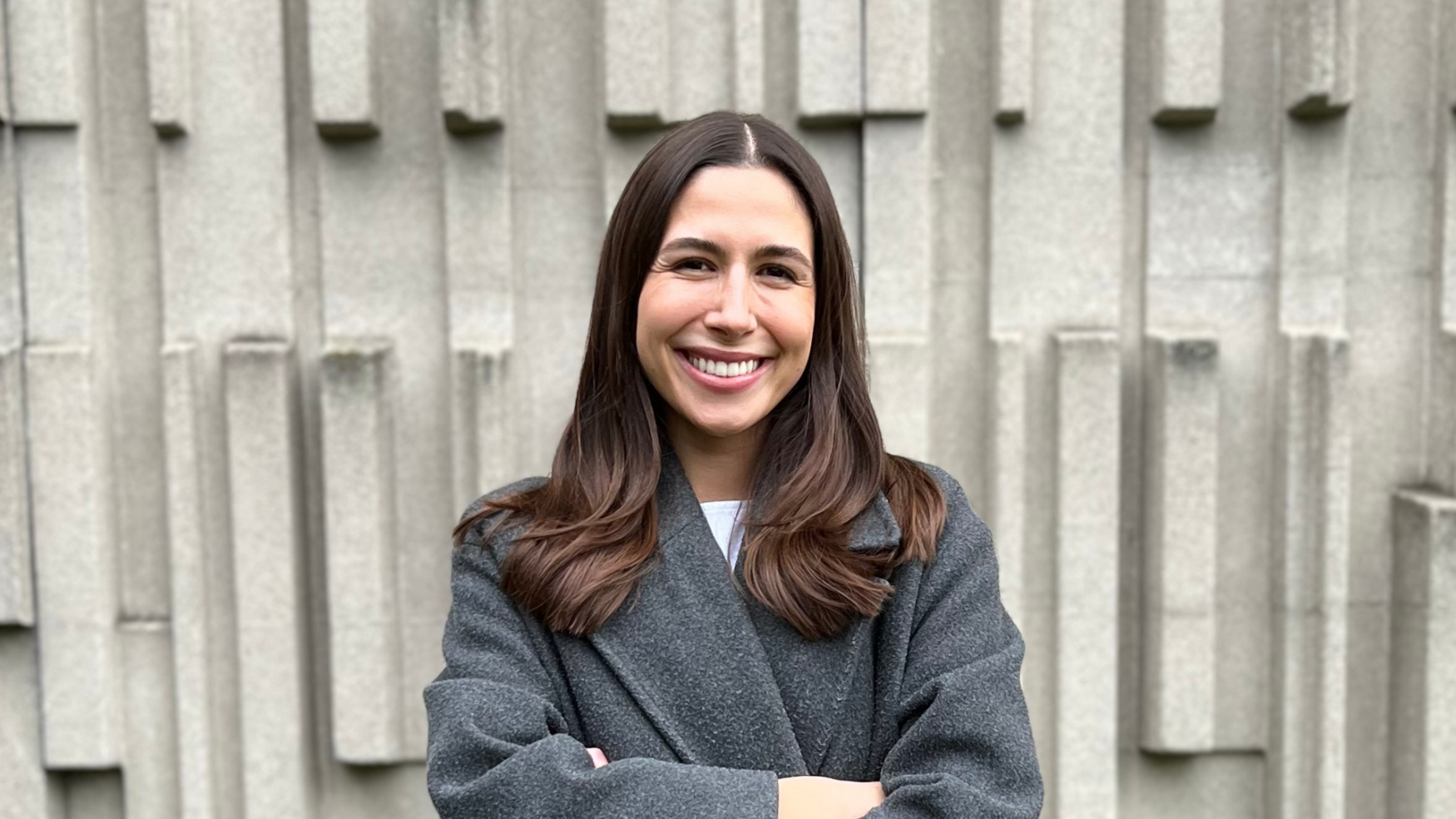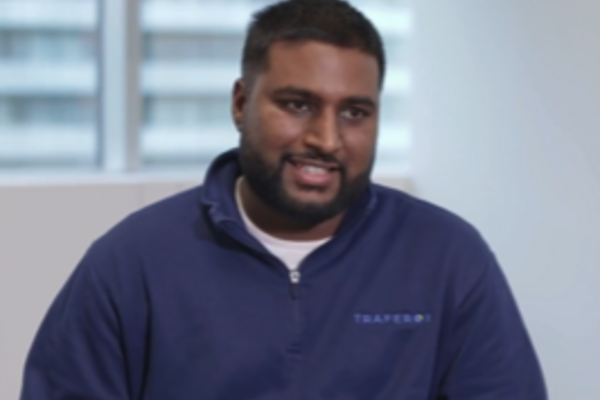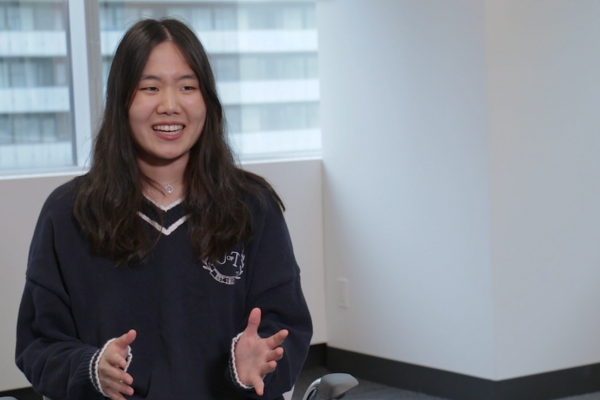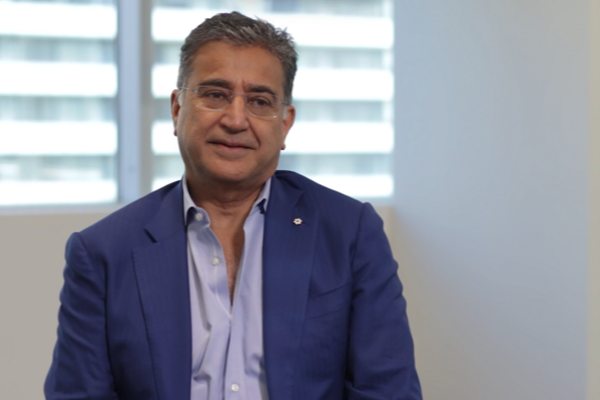Main Second Level Navigation
Breadcrumbs
- Home
- News & Events
- News
- Humans of RHSE: Introducing Georgia Damianakis
Humans of RHSE: Introducing Georgia Damianakis

From spearheading community health projects to advancing clinical pharmacology research, Georgia Damianakis exemplifies dedication to health sciences. With a background in interdisciplinary medical sciences, she is now pursuing a Master of Science in Applied Clinical Pharmacology (MSc ACP) at the University of Toronto. In this interview with Sarah McMahon, she discusses her academic journey, research experience and the challenges she has overcome as a graduate student.
During your undergraduate degree, you took courses in a range of areas including immunology and physiology. What led to your interest in pharmacology?
I really enjoyed taking courses across the medical sciences, however during my third-year pharmacology and therapeutics course, I became particularly fascinated by how pharmaceuticals are used to treat, manage, and prevent diseases. I was interested in learning more about how drugs worked and their application to clinical practice.
I volunteered with Operation Smile, a charity that raises awareness and tackles stigma around cleft palate and cleft lip, and I worked in hospital vaccination and treatment clinics during my undergraduate years. These experiences gave me firsthand insight into the transformative impact healthcare, and especially pharmaceuticals, can have on patients and their families.
These experiences reinforced my desire to improve patient care and access to treatments, ultimately motivating me to pursue graduate studies in clinical pharmacology. I wanted to gain a better scientific understanding of drug action and the drug development process, and I hoped to gain experience in clinical pharmacology research that I could use to make a meaningful impact.
Why did you choose U of T for your graduate studies?
The University of Toronto’s reputation for excellence in scientific research and its affiliations with leading research hospitals made it an obvious choice. Specifically, the MSc ACP program stood out to me for its rigorous and comprehensive curriculum, offering training in clinical trial design, pharmacokinetic analysis, hands-on opportunities for independent research and industry practicums. Additionally, Toronto’s vibrant and diverse culture was a big draw—I felt it was the perfect place to grow personally and professionally.
What kind of impact are you hoping to have with the knowledge and skills you gain from this degree?
I hope to use the knowledge and skills I have developed from my graduate training to make a meaningful impact in healthcare and the pharmaceutical sector. Specifically, I aspire to enhance access to effective and safe pharmaceuticals by applying my expertise in pharmacology, drug development and clinical research.
Through my research in immunotherapies at the Hospital for Sick Children (SickKids) and my clinical experiences at Grand River Hospital, I have seen firsthand how clinical research and comprehensive, effective health care can transform lives.
Hearing from patients managing arthritis and observing the positive outcomes of targeted treatments have reinforced my commitment to advancing patient care. My ultimate goal is to contribute to advancements in pharmaceutical interventions and drive improvements in health outcomes, both locally and globally.
As part of your MSc ACP, you are completing a supervised clinical research project at SickKids, in the SickKids Cell Biology Program. What’s that like?
It’s been an incredible experience. Since May 2024, I’ve been working on an international, multicenter clinical observational study with the Canada-Netherlands Personalized Medicine Network in Childhood Arthritis and Rheumatic Diseases. This prospective, ongoing study is focused on understanding the biology of juvenile idiopathic arthritis and identifying predictors of treatment response.
Under the supervision of Dr. Rae Yeung, professor of paediatrics, immunology and medical science at the University of Toronto, and senior scientist in cell biology at SickKids, I am leading an independent research project examining how body weight and dosing variation influence response outcomes to anti-rheumatic medications.
Applying my coursework to real-world research has been incredibly rewarding. I’ve gained valuable skills in analyzing clinical data and I engage in stimulating scientific discussions with colleagues.
I am fascinated by auto-immune and inflammatory disease, so learning about childhood arthritis in depth from global leaders in the field, as well as analyzing clinical immunotherapy data, have been truly amazing experiences. I’m grateful to Dr. Yeung and the SickKids team for their support and mentorship throughout this project.
What’s been the biggest challenge you’ve overcome as a grad student and how did you do it?
Imposter syndrome has been one of my biggest challenges. In a program filled with talented individuals from diverse backgrounds, it’s easy to question your own abilities and assume others have more experience and knowledge than you do. I’ve come to realize that many of my classmates share similar feelings.
Holding myself to high standards, I often critique my own work and compare my progress to others. However, the support of my mentors, peers, and classmates in the MSc ACP program has been invaluable. Growth comes from focusing on my own strengths and embracing opportunities to learn and these realizations are empowering.
What advice would you give a current undergraduate student, who is considering graduate school?
Reflect deeply on your motivations for pursuing graduate studies and what you hope to achieve from further education. Make sure it’s a path you’re genuinely passionate about, rather than something you feel pressured to do.
Even if you do not have extensive knowledge in the field or it feels outside your comfort zone, if you are interested in the subject area and it aligns with your long-term goals, you should go for it. I didn’t have an extensive background in pharmacology initially, but my interest and curiosity in the field drove me to explore it further and it’s been incredibly rewarding.
When you’re not in the lab or studying, how do you like to spend your free time?
I spend most of my free time with friends and family or staying active through running, soccer and other outdoor activities (I am looking forward to ski season soon!). This past May, I ran the Toronto Half-Marathon, which was a fun and fulfilling experience. I also enjoy reading, travelling and exploring new restaurants and areas in Toronto.
At U of T, I’ve enjoyed getting involved with the graduate community. Over the past year, I served as a communications and marketing associate for the Pharmacology Graduate Student Association.
Another highlight was participating in the Industry Team Case Study 2024 program with the Life Sciences and Career Development Syndicate where I collaborated with fellow graduate students and industry professionals to develop an educational strategy for cardiovascular disease treatment. I am looking forward to participating in more departmental initiatives this year.
Finish this sentence: If I was a superhero, my power would be…
The ability to manipulate time because there's never enough of it!
What is your favourite animal and why?
Cats are my favorite. I grew up with two cats at home and love their companionship and unique personalities.
What are your hidden talents?
I played competitive soccer for many years and I have a strong artistic side. I enjoy playing piano, singing, creative writing and painting.
Is there anything else you’d like to share?
I’m incredibly thankful to my professors, classmates and mentors at U of T for their support throughout my graduate studies. Studying clinical pharmacology here has been a truly enriching experience and I’m excited for what’s to come.
If you know someone we should feature, or if you wish to be featured, reach out to our RHSE Communications Officer.


